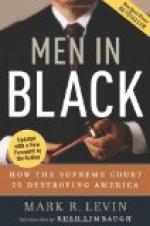The client watches the lawyer with affectionate admiration. True, he did not do exactly as he was wanted during the trial. He should have asked those questions he suggested, but now he is doing grandly. When the lawyer is through the client feels splendidly. He sees but one side of the case and believes in it absolutely. With such a good talker the jury cannot fail of being convinced.
When the lawyer sits down the client shakes him by the hand and tells him how well he has done. He might have been willing to settle the case for a thousand dollars before, but now he wouldn’t pay a cent, not one cent. Later, should the jury find against him, even to the amount of the thousand dollars which he was willing to pay, he feels terribly disappointed. There must have been something very much amiss in the jury-room.
The judge while the summing up is going on, is not very attentive. His part of the case is over. While the proof was being given he was alert. True, the charge is coming afterwards, but he knows fairly well what he is going to say, and it is going to be formal. It is the function of the judge to control the address of counsel, but the counsel are sometimes very hard to control.
In the criminal trials, reference is made to the emotions of the defendant’s family; the devoted, anxious wife, the poor little children who may bear the stigma of their father’s disgrace, should the verdict go against him. Since the domestic life of neither party to the trial has appeared in evidence, such things being entirely “irrelevant and immaterial,” it does not make a great deal of difference whether the picture is accurate or wholly fanciful. The defendant may be a drunkard, a burden to his wife, and a horror to his children; he may have abandoned his family to their own resources; it is possible that he has never had any family at all. The lawyer has no right to refer in his summing up, or otherwise, to anything that has not been properly submitted in evidence. He is guilty of unfair practice in telling the jury about the defendant’s family or circumstances, unless this has been part of the case, which is improbable. He knows this well; so does his opponent and the judge. And should the opposing lawyer protest, the judge will say, looking up, “Be careful, counselor, be careful.” The counselor bows respectfully and probably goes on in the same vein. The judge has not heard exactly what was said and feels that the lawyers, if they are not too blatant and noisy, may say what they please. There must not be too much talk about the wicked, money-grabbing, soulless corporation, not too much appeal for the down-trodden poor, nor an over indulgence in personalities. The lawyers must not call the other side liars and thieves too openly. That is, they may say they are untruthful, but liar is too strong. The denunciation must be a little restrained.




